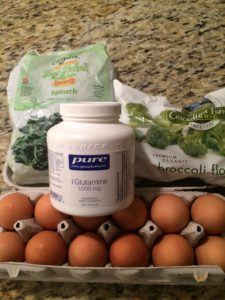L-GLUTAMINE BENEFITS & USES. COULD IT HELP YOU?
 Glutamine is one of the amino acids.
Glutamine is one of the amino acids.
Technically, glutamine is created in the human body when the semi-essential amino acid glutamate (or glutamic acid) is broken down and binds with nitrogen-containing ammonia molecules. It converts to this amino acid called glutamic acid when it passes through the blood-brain barrier. All this fancy talk means this: glutamic acid has many beneficial uses and purposes in the body. It’s critical for cerebral function. It is the building blocks of proteins and DNA. It serves as an energy source, aids the digestive tract, helps with muscle growth and maintenance, decreases muscle wasting and more. It’s found predominantly in our muscles and is probably one of the most abundant and metabolically active amino acid in our bodies.
WHO SHOULD TAKE L-GLUTAMINE?
Athletes & Body Builders:
Body builders, obstacle course racers, American Ninja Warriors lol and serious athletes who use their muscles to their fatigue point should consider it. Extensive exercise depletes the body’s reserves. This is why many athletes take glutamine. They want to hasten recovery times, prevent muscle wasting and make it easier to build and maintain muscle mass.
Recipients of Chronic Stress:
Chronic stress causes the release of the hormone cortisol into our blood. The excess cortisol depletes our body’s supply of glutamine. Lymphocytes — antibodies that play a vital role in immunity — require glutamine to flourish so, when our glutamine levels reach empty (it’s like a car with no gas), your immune system becomes compromised and your risk for infections goes up.
Major Bodily Traumas and Surgery Patients:
Metabolic stress situations, like trauma, surgery or cancer, are good examples of the need for more glutamine in the body, as are burns and sepsis. Under these traumatic conditions, it’s important that there is adequate intake of glutamine to meet the situation that’s being encountered by the body.
Autoimmune Diseases and Leaky Gut:
For those with leaky gut or inflammatory bowel disease, L-glutamine serves as a source of fuel for the cells lining the intestines. It promotes the maintenance of a healthy digestive tract. I take it every day because it helps to protect the digestive tract lining and maintain the integrity of the intestinal mucosa. Our gastrointestinal tract is by far the greatest user of this amino acid, next to our muscles. It’s been used successfully with HIV and cancer patients to help them absorb nutrients and, of course, gain weight.
One word of caution here: I did find some research that showed you should be careful about the amount of glutamine you take if you have a history of yeast infections because this amino acid can increase yeast growth.
The big benefit is that glutamine helps to reduce intestinal permeability, aka leaky gut. This is the condition in which food particles, instead of remaining inside your digestive tract, get through your intestines and into your bloodstream. You see only the NUTRIENTS are supposed to pass through your intestines and get into your bloodstream, not the food particles themselves.
The theory is that the immune system sees it, gets confused and WHAM!, before you know it, you have food sensitivities. This would explain why folks with autoimmune diseases frequently have leaky gut too. After all, their immune systems are already a bit confused SO, which came first … the chicken or the egg?
Some studies have shown that glutamine is also helpful for people with connective tissue diseases and damaged tissue from radiation treatments.
In my case, I have leaky gut & a few autoimmune diseases. One of these diseases affects my connective tissue. So I take L-Glutamine for a few reasons! Not to mention that its used by white blood cells and contributes to normal immune system function.
Muscle-Wasting Diseases:
L-glutamine helps prevent the kind of muscle loss that can accompany prolonged bed rest or illnesses in which people can’t manufacture their own supply of glutamine.
How do you feel?
All of these competing stressors can begin to outpace your body’s ability to produce this amino acid. If that happens, you could start to experience deficiencies. You may feel lethargic, have muscle wasting, and/or find yourself increasingly falling sick.
Technically, glutamine is classified as a semi-essential amino acid. This means for most of us, under normal circumstances, the body can manufacture enough on its own to meet the physiological demands that we place on our body. However, there are times that glutamine becomes an essential amino acid (as mentioned above). You and your doctor can decide if you meet these criteria.
Sources of L-Glutamine:
- Broccoli
- Spirulina
- Cabbage
- Asparagus
- Beets
- Spinach
- Kale
- Some fermented foods
- Protein rich foods (like beef & chicken)
- Supplementation
Bottom Line:
While L-glutamine does offer support for many, it’s ill-advised for people with liver or kidney disease.
Obviously, (& like I always say), check with your doctor before you supplement. Glutamine may interact with certain medications and dietary supplements. The two of you need to work together toward your good health. I’m here to as your curator for information, teaching you from experience and helping you to navigate the complex world of autoimmune disease remission and good health.
January 12, 20173 Comments
Comments are closed.



Love the post. I started taking L-glutamine this year and found that it really helps with the the digestive tract. After reading this I’m starting to believe that it might have been contributing to some other benefits I’ve seen.
After reading your blog I looked into L-glutamine further that it can increase levels of naturally occurring Human Growth Hormone (HGH). Increased levels of HGH accelerates Metabolism. This allows the more efficient processing of foods and enhancing the efficient metabolism of fats. which in-turn improves in fat reduction and the building of lean muscle.
So, If I am understanding the above , this could also be used as a diet supplement to decrease fat – correct?
Some people do take it in hopes of weight-loss but most of the reports on its effectiveness are conflicting. There was one study however that was encouraging. “The European Journal of Clinical Nutrition” found that obese women who took glutamine supplements for 4 weeks lost weight without changing their diet or exercise habits! Obviously, I’m a fan of the supplement given my experience with its use for leaky gut, autoimmune and muscle wasting prevention but always recommend folks talk to their DR before trying to make sure its right for them.